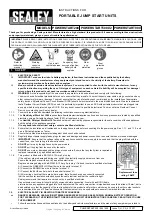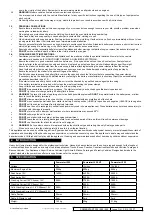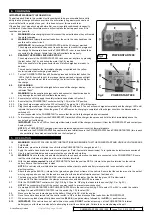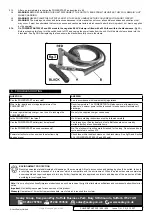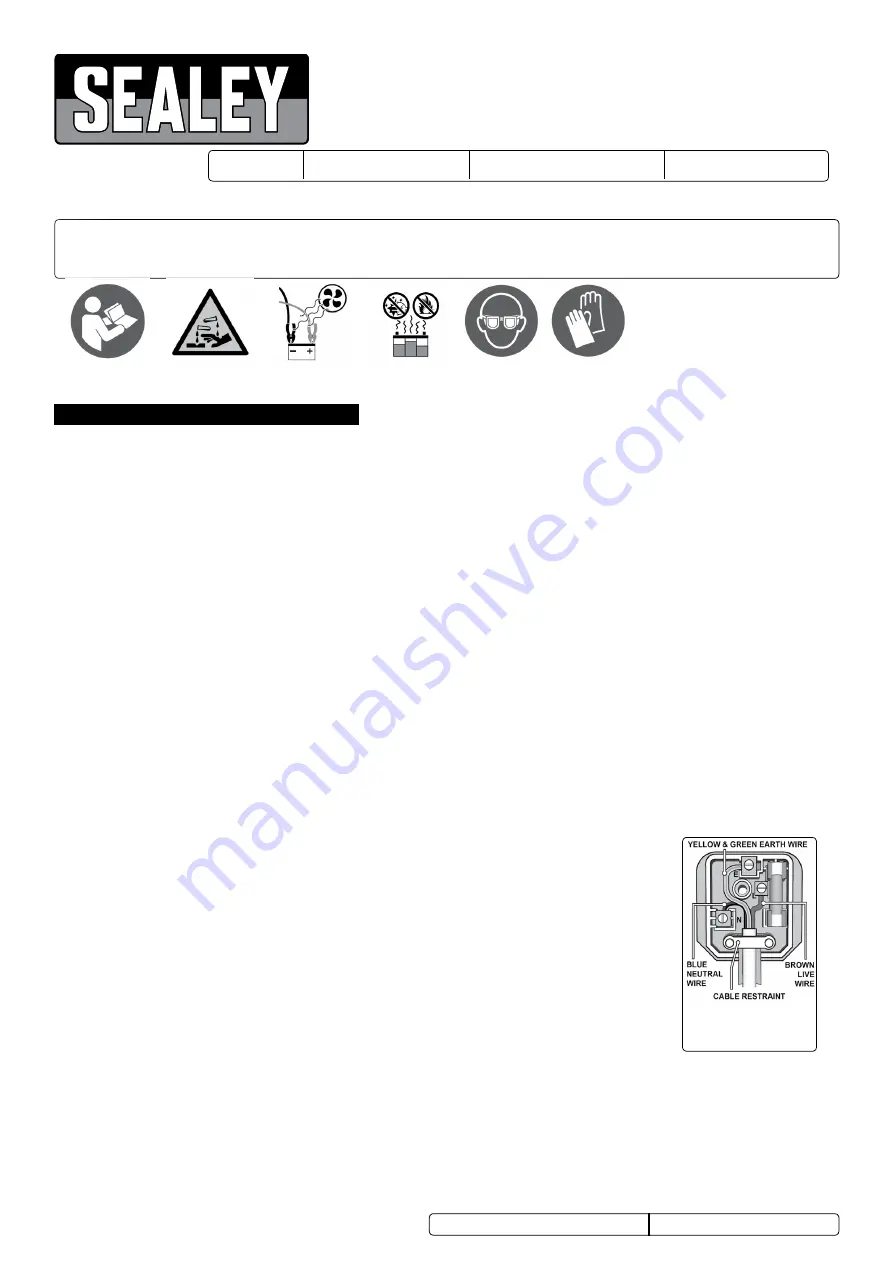
instructions for
portable jump start units
thank you for purchasing a sealey product. manufactured to a high standard, this product will, if used according to these instructions,
and properly maintained, give you years of trouble free performance.
IMPORTANT:
PLEASE READ THESE INSTRUCTIONS CAREFULLY. NOTE THE SAFE OPERATIONAL REQUIREMENTS, WARNINGS & CAUTIONS. USE
THE PRODUCT CORRECTLY AND WITH CARE FOR THE PURPOSE FOR WHICH IT IS INTENDED. FAILURE TO DO SO MAY CAUSE DAMAGE AND/OR
PERSONAL INJURY AND WILL INVALIDATE THE WARRANTY. KEEP THESE INSTRUCTIONS SAFE FOR FUTURE USE.
1. saFetY
1.1.
eleCtriCal saFetY
important:
to reduce the risk of a battery explosion, follow these instructions and those published by the battery
manufacturer and the manufacturer of any equipment you intend to use in the vicinity of the battery. remember to
review warning marks on all products and on engines.
modern vehicles contain extensive electronic systems. You are required to check with the vehicle manufacturer, for any
specific instructions regarding the use of this type of equipment on each vehicle. No liability will be accepted for damage /
injury, where this product is not used in accordance with all instructions.
WarninG!
it is the responsibility of the owner and the operator to read, understand and comply with the following:
You must check all electrical products before use to ensure that they are safe. You must inspect power cables, plugs, sockets and any
other connectors for wear or damage. You must ensure that the risk of electric shock is minimised by the installation of appropriate
safety devices. A residual current circuit Breaker (rccB) should be incorporated in the main distribution board. We also recommend
that a residual current Device (rcD) is used. it is particularly important to use an rcD with portable products that are plugged into
a supply which is not protected by an rccB. if in any doubt consult a qualified electrician. You may obtain a residual current
Device by contacting your sealey dealer.
1.1.1.
You must also read and understand the following instructions concerning electrical safety.
1.1.2.
the
electricity at Work act 1989
requires that all portable electrical appliances, if used on business premises, are tested by a qualified
electrician, using a Portable Appliance tester (PAt), at least once a year.
1.1.3.
the
Health & safety at Work act 1974
makes owners of electrical appliances responsible for the safe condition of those appliances
and the safety of the appliance operators.
if in any doubt about electrical safety, contact a qualified electrician.
1.1.4.
Ensure that the insulation on all cables and on the appliance is safe before connecting it to the power supply. see 1.1.1. and 1.1.2. and
use a Portable Appliance tester.
1.1.5.
Ensure that cables are always protected against short circuit and overload.
1.1.6.
regularly inspect power supply leads, plugs for wear and damage and power connections, to ensure that none is loose or damaged.
1.1.7.
important
: Ensure that the voltage rating on the appliance suits the power supply to be used and that the plug is fitted with the
correct fuse - see fuse rating in these instructions.
8
Do not
pull or carry the appliance by the power cable.
8
Do not
pull the plug from the socket by the cable.
8
Do not
use worn or damaged cables, plugs or connectors. Ensure that any faulty item is repaired or
replaced immediately by a qualified electrician.
1.1.8.
This product is fitted with a BS1363/A 13 Amp 3 pin plug.
if the cable or plug is damaged during use, switch the electricity supply and remove from use.
Ensure that repairs are carried out by a qualified electrician.
Replace a damaged plug with a BS1363/A 13 Amp 3 pin plug. If in doubt contact a qualified electrician.
A) Connect the GREEN/YELLOW earth wire to the earth terminal ‘E’.
B) Connect the BROWN live wire to the live terminal ‘L’.
C) Connect the BLUE neutral wire to the neutral terminal ‘N’.
D)
After wiring, check that there are no bare wires, that all wires have been correctly connected,
that the cable outer insulation extends beyond the cable restraint and that the restraint is tight.
Sealey recommend that repairs are carried out by a qualified electrician.
if an extension reel is used it should be fully unwound before connection. A reel with an rcD fitted is
preferred since any appliance plugged into it will be protected. the cable core section is important and should be at least 1.5mm², but to
be absolutely sure that the capacity of the reel is suitable for this product and for others which may be used in the other output sockets,
we recommend the use of 2.5mm² section cable. if extension reel is to be used outdoors, ensure it is marked for outdoor use.
1.2.
eleCtriCal saFetY in relation to batterY CHarGers
▲
DanGer! be aWare, leaD-aCiD batteries Generate eXplosiVe Gases DurinG normal batterY operation.
For tHis reason, it VerY important to reaD anD FolloW tHese instruCtions CareFullY, eaCH time You use
tHe eQuipment.
9
follow these instructions and those published by the battery and vehicle manufacturers, and the maker of any equipment you intend to
replacement fuse
rating: 3 amp
P
OWERSTART200 / 500 / 900 Issue 7 (H, F, 2) 21/12/17
Original Language Version
© Jack Sealey Limited
moDels: poWerstart200 poWerstart500.V2 poWerstart900
refer to
instruction
manual
Warning:
corrosive
substance
use in well
ventilated areas
Wear
protective
gloves
Wear
eye
protection
Keep away from
sources of ignition;
battery could
explode

